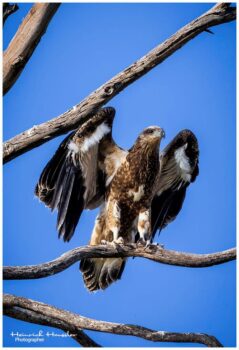 New England is home to some remarkable birds, and with a number now being threatened by climate change as well as loss of habitat, Sustainable Living Armidale (SLA) will host a presentation on protecting its threatened birds of prey species on Thursday, 2 September at 7pm.
New England is home to some remarkable birds, and with a number now being threatened by climate change as well as loss of habitat, Sustainable Living Armidale (SLA) will host a presentation on protecting its threatened birds of prey species on Thursday, 2 September at 7pm.
While many may not know it, the Northern Tablelands is home to the Little Eagle (Hieraaetus morphnoides), the Square-tailed Kite (Lophoictinia isura), and the White-bellied Sea-Eagle (Haliaeetus leucogaster). The Northern Tablelands Local Land Services has been monitoring these threatened raptors for a number of years, accumulating population and behavioural data to learn more about what is happening in our environment.
Part of SLA’s bi-monthly forum series normally held at Kent House, the presentation, by Australia’s foremost raptor expert Dr Stephen Debus, Northern Tablelands Local Land Services Officer Euan Belson and UNE’s Associate Professor Paul McDonald, will be instead be a Zoom session at 7pm on Thursday 2 September. Anyone interested can visit this link and join the presentation at this time.
The presenters will talk about our current knowledge and how we can influence critical factors in our control. They will also be raising awareness and honing community bird-spotting skills.
The talk will be in two parts, with the first outlining the current level of knowledge gained so far across 8 years of research in the region. The presenters will then outline their current understanding of the populations of these species in the region and how they respond to various threats they now face, including land development and climate change. Scientists measure the raptors’ likely survival in productivity terms, such as how well they are breeding. They will highlight critical factors for the ongoing maintenance and survival of these apex predator species.
The second half of the talk will discuss some ways we can influence the critical factors that are within our control. This year, NTLLS and UNE are developing a strategy for growing the current monitoring program and improving the health of these populations. They are building a powerful and active group of stakeholders interested in targeted activities to help support the birds.
However, landholders fortunate enough to have resident birds will have the opportunity to interact with the scientific team and actually contribute to the research right across the Northern Tablelands.
